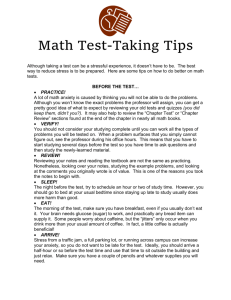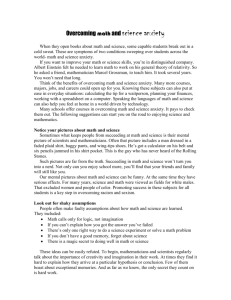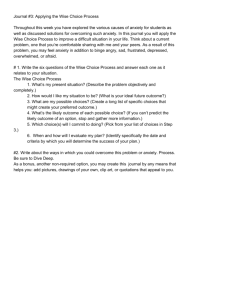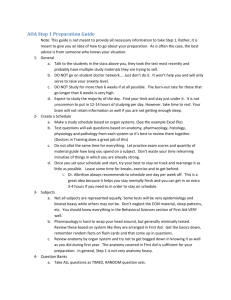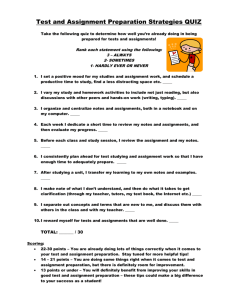HOW TO IMPROVE YOUR PERFORMANCE IN ASSESSMENT
advertisement
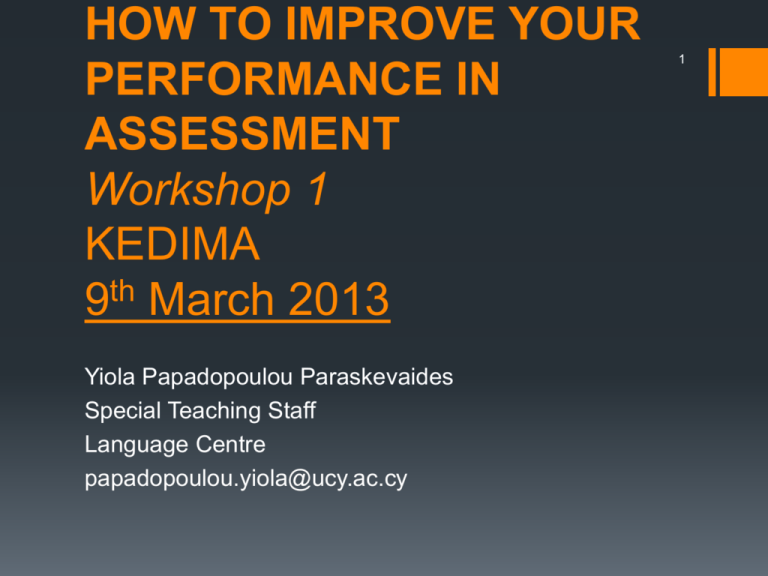
HOW TO IMPROVE YOUR PERFORMANCE IN ASSESSMENT Workshop 1 KEDIMA 9th March 2013 Yiola Papadopoulou Paraskevaides Special Teaching Staff Language Centre papadopoulou.yiola@ucy.ac.cy 1 2 Contents: PART A: How to manage your time effectively - Are you a morning person or a night owl? – Quiz PART B: How to manage your stress – Overcoming test anxiety PART C: Test Taking Test Preparation PART D: Test Taking Techniques: Multiple Choice tips and techniques True/False tips and techniques 3 PART A: Time management Developing time management skills is a journey that may begin today, but needs practice and other guidance along the way. One goal is to help yourself become aware of how you use your time as one resource in organizing, prioritizing, and succeeding in your studies in the context of competing activities of friends, work, family, etc. 4 Exercise: Take a note on how you spend a 24-hour day based on the following parameters: classes, sleeping, studying, meeting with friends/family, working, personal care/grooming taking exercise, cooking/eating/clean up, transportation, relaxing/TV/video games, socializing/entertainment, etc. Ten strategies on using time effectively at University 5 1. Blocks of study time and breaks As your university semester begins and your course schedule is set, develop and plan for, blocks of study time in a typical week. Blocks ideally are around 50 minutes, but perhaps you become restless after only 30 minutes? Some difficult material may require more frequent breaks. Shorten your study blocks if necessary-but don't forget to return to the task at hand! What you do during your break should give you an opportunity to have a snack, relax, or otherwise refresh or re-energize yourself. For example, place blocks of time when you are most productive: are you a morning person or a night owl? Quiz – Are you a morning person or a night owl? Discussion of results 6 Ten strategies on using time effectively at University 7 2. Dedicated study spaces Determine a place free from distraction (no cell phone or text messaging!) where you can maximize your concentration and be free of the distractions that friends or hobbies can bring! You should also have a back-up space that you can escape to, like the library, departmental study center, even a coffee shop where you can be anonymous. A change of venue may also bring extra resources. What is the best study space you can think of? What is another? 3. Weekly reviews Weekly reviews and updates are also an important strategy. Each week, like a Sunday night, review your assignments, your notes, your calendar. Be mindful that as deadlines and exams approach, your weekly routine must adapt to them! What is the best time in a week you can review? Strategies on using time effectively at University 8 4. Prioritize your assignments When studying, get in the habit of beginning with the most difficult subject or task. You'll be fresh, and have more energy to take them on when you are at your best. For more difficult courses of study, try to be flexible: for example, build in reaction time when you can get feedback on assignments before they are due. What subject has always caused you problems? 5. Achieve "stage one"--get something done! The Chinese adage of the longest journey starting with a single step has a couple of meanings: First, you launch the project! Second, by starting, you may realize that there are some things you have not planned for in your process. Details of an assignment are not always evident until you begin the assignment. Another adage is that "perfection is the enemy of good", especially when it prevents you from starting! Given that you build in review, roughly draft your idea and get going! You will have time to edit and develop later. What is a first step you can identify for an assignment to get yourself started? Ten strategies on using time effectively at University 6. Postpone unnecessary activities until the work is done! Postpone tasks or routines that can be put off until your work is finished! This can be the most difficult challenge of time management. As learners we always meet unexpected opportunities that look appealing, then result in poor performance on a test, on a paper, or in preparation for a task. Distracting activities will be more enjoyable later without the pressure of the test, assignment, etc. hanging over your head. Think in terms of pride of accomplishment. Instead of saying "no" learn to say "later". What is one distraction that causes you to stop studying? 9 Ten strategies on using time effectively at University 7. Identify resources to help you Are there tutors? An expert friend? Have you tried a keyword search on the Internet to get better explanations? Are there specialists in the library that can point you to resources? What about professionals and professional organizations. Using outside resources can save you time and energy, and solve problems. Write down three examples for that difficult subject above? Be as specific as possible. 8. Use your free time wisely Think of times when you can study "bits" as when walking, riding the bus, etc. Perhaps you've got music to listen to for your course in music appreciation, or drills in language learning? If you are walking or biking to school, when best to listen? Perhaps you are in a line waiting? Perfect for routine tasks like flash cards, or if you can concentrate, to read or review a chapter. The bottom line is to put your time to good use. What is one example of applying free time to your studies? 10 Ten strategies on using time effectively at University 11 9. Review notes and readings just before class This may prompt a question or two about something you don't quite understand, to ask about in class, or after. It also demonstrates to your teacher that you are interested and have prepared. How would you make time to review? Is there free time you can use? 10. Review lecture notes just after class Then review lecture material immediately after class. The first 24 hours are critical. Forgetting is greatest within 24 hours without review! How would you do this? Is there free time you can use? Exercise: Fill in the following sheets according to your assignments and schedule WEEKLY ASSIGNMENTS PLANNER ASSIGNMENT SHEET – DUE DATE (DEADLINE) FINISHED MONTHLY STUDY PLANNER WEEKLY STUDY SCHEDULE BASED ON HOURS – BETWEEN 6.00AM-1.00AM 12 PART B: How to manage your stress – Overcoming test anxiety Most students experience some level of anxiety during an exam However, when anxiety affects exam performance it has become a problem. General preparation/building confidence: Review your personal situation and skills Academic counselors can help you in these areas. Developing good study habits and strategies. Managing time Organizing material to be studied and learned Take a step by step approach to build a strategy and not get overwhelmed Outside pressures success/failure consequences (grades, graduation), peer pressure, competitiveness, etc. Reviewing your past performance on tests to improve and learn from experience 13 How to manage your stress – Overcoming test anxiety 14 Test preparation to reduce anxiety: Approach the exam with confidence: Use whatever strategies you can to personalize success: visualization, logic, talking to your self, practice, team work, journaling, etc. View the exam as an opportunity to show how much you've studied and to receive a reward for the studying you've done Be prepared! Learn your material thoroughly and organize what materials you will need for the test. Use a checklist Choose a comfortable location for taking the test with good lighting and minimal distractions Allow yourself plenty of time, especially to do things you need to do before the test and still get there a little early How to manage your stress – Overcoming test anxiety 15 Strive for a relaxed state of concentration Avoid speaking with any fellow students who have not prepared, who express negativity, who will distract your preparation A program of exercise is said to sharpen the mind Get a good night's sleep the night before the exam Don't go to the exam with an empty stomach Fresh fruits and vegetables are often recommended to reduce stress. Stressful foods can include processed foods, artificial sweeteners, carbonated soft drinks, chocolate, eggs, fried foods, junk foods, pork, red meat, sugar, white flour products, chips and similar snack foods, foods containing preservatives or heavy spices Take a small snack, or some other nourishment to help take your mind off of your anxiety. Avoid high sugar content (candy) which may aggravate your condition How to manage your stress – Overcoming test anxiety 16 During the test: Read the directions carefully Change positions to help you relax If you go blank, skip the question and go on If you're taking an essay test and you go blank on the whole test, pick a question and start writing. It may trigger the answer in your mind Don't panic when students start handing in their papers. There's no reward for finishing first. How to manage your stress – Overcoming test anxiety 17 Use relaxation techniques If you find yourself tensing and getting anxious during the test: Relax; you are in control. Take slow, deep breaths Don't think about the fear Pause: think about the next step and keep on task, step by step Use positive reinforcement for yourself: Acknowledge that you have done, and are doing, your best Expect some anxiety It's a reminder that you want to do your best and can provide energy Just keep it manageable Realize that anxiety can be a "habit" and that it takes practice to use it as a tool to succeed How to manage your stress – Overcoming test anxiety 18 After the test, review how you did List what worked, and hold onto these strategies It does not matter how small the items are: they are building blocks to success List what did not work for improvement Celebrate that you are on the road to overcoming this obstacle Check out local centers and resources in your school for assistance! If you are aware that you have a problem with test anxiety, be sure your teacher or instructor knows before any testing begins (and not the hour before!). There may be other options to evaluate your knowledge or performance within the subject matter. How to manage your stress – Overcoming test anxiety 19 Organizing for test taking Begin reviewing early This will give your brain time to get comfortable with the information Conduct short daily review sessions You can ease into a more intense review session prior to major exams Read text assignments before lectures This will help you identify concepts that the professor considers important and that are already somewhat familiar Review notes immediately after lectures This will help you identify information that you do not understand while the lecture is still fresh in your memory--and other students' memories as well. When you review immediately, you'll have time to clarify information with other students Review with a group This will enable you to cover important material that you may overlook on your own Conduct a major review early enough to allow for a visit to the instructor during his office hours if necessary Break up the study tasks into manageable chunks, especially during major reviews prior to exams. Studying three hours in the morning and three in the evening will be more effective than studying at a six hour stretch. Studying while you are mentally fatigued is usually a waste of time Study the most difficult material when you are alert How to manage your stress – Overcoming test anxiety 20 Emergency test preparation A structured approach to cramming Preview material to be covered Be selective: skim chapters for main points Concentrate on the main points Begin with 5 sheets of paper: 1. Identify 5 key concepts or topics that will be covered on the test Enter one at the top of each page Use only key words or short phrases 2. In your own words, write an explanation, definition, answer, etc of several lines or so for the key concept Do NOT use the text or your notes 3. Compare your response of (2) with the course source information (text and lecture notes) 4. Edit or re-write your understanding of each topic considering this course information How to manage your stress – Overcoming test anxiety 5. Sequence and number each page of your topics 1 - 5 in order of importance; 1 = most important 6. Follow the above process for two additional concepts if you have time 7. Place them in the 1 - 5 sequence and change numbering to 1 - 7 8. Follow the above process for one or two more concepts for a total of nine. Follow your comfort level; add topics only as necessary 9. Try not to exceed nine concepts; focus on the most important 10. Review the day of the test, but try to relax just before 21 22 PART C: TEST TAKING When you take a test, you are demonstrating your ability to understand course material or perform certain tasks. Successful test taking avoids carelessness. Examples of objective tests are true-false, multiple choice, fill-in-the-blank. Examples of subjective texts are short answer, essay, or oral exams 23 TEST TAKING TEN TIPS FOR SUCCESS! 1.Analyze how you did on a similar test in the past. Review your previous tests and sample tests provided by your teacher. Each test you take prepares you for the next one! 2. Arrive early for tests. List what you need beforehand to avoid panic. Good preparation prepares you for the task at hand. 3. Be comfortable but alert. Choose a comfortable location with space enough that you need Don't slouch; maintain good posture. 4. Stay relaxed and confident. Keep a good attitude and remind yourself that you are going to do your best. If you find yourself panicking, take a few deep breaths Don't talk to other students right before: stress can be contagious. 5. Read directions carefully! and avoid careless errors. 24 TEST TAKING TEN TIPS FOR SUCCESS 6. If there is time, quickly look through the test for an overview. Scan for keywords. If permitted, jot any notes that come to mind. 7. Answer questions in a strategic order: Easy questions first to build confidence. Then those with the most point value. On objective tests, eliminate obvious incorrect answers. On essay tests, broadly outline your answer and sequence of points. 8. Review! if you have time. Resist the urge to leave when you complete the exam-check if you have answered all the questions, and not made any errors or mis-marked any answers. 9. Change answers to questions if you erred, or misread the question! You may also find information in the test that will correct a previous answer. 10. Decide on and adopt study strategies that work best for you. Review where you succeed and where you are challenged. Check out your academic support center or a trusted teacher for advice. 25 TEST PREPARATION THINKING AND MEMORIZING The role of silence in learning Stresses and responsibilities can negatively impact your preparation and performance before engaging with a critical task and/or considering longer range options in your life. Before consideration and engagement, pause to clear your mind of distractions. Create an environment, beginning with silence, concentrate and focus forward your energies. Remove as many disturbances as possible: cell phone and live conversations, music and extraneous noise, visual distractions, etc. 26 TEST PREPARATION Logistics of finding "silence" When: Early mornings or late nights can provide times when all is still, even in busy dorms and households. Daytimes can provide breaks: schedule your calendar and develop a routine. So also, if your schedule allows for group exercise, meditation, etc. you can intentionally allocate part of this time to clear your mind. Where: Socrates praised the outdoors as a natural environment away from distractions of a busy life (but don't take your cell phone with you!). Locations include gardens, near-by parks, river walks, etc. Residential retreats include a soothing hot bath, even out-of-the-way spots like work and laundry rooms where few like to go. Urban oases include museums, libraries, even lesser-used public spaces. Create your own space: even using headphones with the sound off, or adjusting furnishings of your study space or bedroom can make a difference. Even in busy, noisy spaces you can find silence: focus on times between sounds or on still objects--even tables, chairs, walls, etc. that are fixed that can initiate your process. 27 TEST PREPARATION How: Creating silence takes practice, even discipline. There are classes in meditation in (spiritual) centers that can offer guidance. There are techniques in breathing that can assist: breathe in through your nose, out through your mouth, deeply but comfortably. Posture can facilitate, and also impede, striving for silence. Uncross your legs and arms, rest your hands in your lap, straighten your back, and gain a comfortable position to avoid fidgeting, etc. Careful reading of spiritual texts, poetry, etc. can inspire silence, but also distract from the centering and creating the silent space within. 28 TEST PREPARATION CONCENTRATING WHILE STUDYING Concentration: the ability to direct your thinking The art or practice of concentration, no matter if studying biology or playing pool, is to focus on the task at hand and eliminate distraction We all have the ability to concentrate -- sometimes. Think of the times when you were "lost" in something you enjoy: a sport, playing music, a good game, a movie. Total concentration. But at other times, Your mind wanders from one thing to another Your worries distract you Outside distractions take you away before you know it The material is boring, difficult, and/or not interesting to you. These tips may help: They involve What you can control in your studies Best practices 29 TEST PREPARATION Before engaging in your studies, and concentrating, try to center yourself with silence, clearing your mind of distractions that may disrupt your productivity. What you can control in your studies: "Here I study" Get a dedicated space, chair, table, lighting and environment Avoid your cellphone or telephone Put up a sign to avoid being disturbed or interrupted If you like music in the background, OK, but don't let it be a distraction. (Research on productivity with music versus without music is inconclusive) Stick to a routine, efficient study schedule Accommodate your day/nighttime energy levels Focus Before you begin studying, take a few minutes to summarize a few objectives, gather what you will need, and think of a general strategy of accomplishment Incentives Create an incentive if necessary for successfully completing a task, such as calling a friend, a food treat, a walk, etc. For special projects such as term papers, design projects, long book reviews, set up a special incentive 30 TEST PREPARATION Change topics Changing the subject you study every one to two hours for variety Vary your study activities Alternate reading with more active learning exercises Ask yourself how you could increase your activity level while studying? Perhaps a group will be best? Creating study questions? Take regular, scheduled breaks that fit you Do something different from what you've been doing (e.g., walk around if you've been sitting), and in a different area Rewards Give yourself a reward when you've completed a task Best Practices: You should notice improvement in a few days But like any practice, there will be ups, levels, and downs: It will benefit other activities you do! PART D: TEST TAKING TECHNIQUES: TRUE/FALSE QUESTIONS 31 You have a 50% chance of getting a true-or-false statement correct. You can increase your odds of getting the right answer if you realize that if any part of the statement is false, the entire statement must be false. Double check the numbers, facts, and dates in true-or-false statements. Sometimes this information may be altered slightly, making the statement false. When statements contain absolutes such as all, always, everyone, never and no one are likely to be false. Example: It is always a bad idea to change your answer to a question. The above statement is false. TEST TAKING TECHNIQUES: TRUE/FALSE QUESTIONS Statements that include qualifiers such as sometimes, perhaps, and maybe are more likely to be true. Example: It is sometimes a bad idea to change your answer to a question. The above statement is true. Negatives can be confusing. If the question contains negatives, as "no, not, cannot" Drop the negative and read what remains. Decide whether that sentence is true or false. If it is true, its opposite, or negative, is usually false. Long sentences often include groups of words set off by punctuation. Pay attention to the "truth" of each of these phrases. If one is false, it usually indicates a "false" answer. 32 TEST TAKING TECHNIQUES: TRUE/FALSE QUESTIONS 33 Guessing: Often true/false tests contain more true answers than false answers. You have more than 50% chance of being right with "true". However, your teacher may be the opposite. Review pasts tests for patterns... Unfortunately, none of these rules leads you to the correct answer all of the time1 TEST TAKING TECHNIQUES: THE MULTIPLE CHOICE TEST Read directions carefully Look through the entire test, and plan your time accordingly. Do not dwell on any question too long. If you can’t answer the question, move on and come back to the question ifyou have time at the end. Even if you think you have more knowledge about the material than the author of the material or you think the author is wrong, go with what the author says, not what you think. Read through all the answers before picking one. If one of your choices is a combination of two or more answers (such as A and B) remember that all parts of the answer must be correct (A must be correct answer and B must also be a correct answer). 34 TEST TAKING TECHNIQUES: THE MULTIPLE CHOICE TEST When in doubt, and one answer includes language from the question, go with that answer. Also look for clues in the question that may help give away the answer. Look at long answers first, especially if one answer is much longer than the others. A longer answer is more likely to be correct than a shorter answer. Why? It usually takes more words to write a correct answer because it needs to be phrased carefully. Also, right answers may need qualifying phrases to make them correct. Wrong answers are wrong anyway, so it doesn’t matter how they are written. Eliminate answers with all-inclusive words such as all, everyone, none, always and nobody. Answers that include such words are quite likely wrong. Usually, the only time answers with such words are correct is when that is exactly what the author said. If there is one exception, the answer will be wrong. 35 TEST TAKING TECHNIQUES: THE MULTIPLE CHOICE TEST When a question asks for the main idea of the selection or the best possible title, make sure your answer is broad enough to cover all parts of the selection. Sometimes the last answer will be ‘all of the above’. If you are fairly sure that two of the three answers are correct but are unsure about the third answer, go with ‘All of the above’. Two questions on the test may be similar. Use the correct answer for one question to help you find the correct answer for the other. Allow at least a minute or two to check over your answer sheet. PRACTICE MULTIPLE CHOICE TEST 36 QUESTIONS??? GOOD LUCK IN YOUR NEXT TEST!!! CONTACT ME FOR FURTHER INFORMATION OR NOTES: papadopoulou.yiola@ucy.ac.cy THE END!!! THANK YOU VERY MUCH AND SEE YOU SOON!
